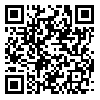BibTeX | RIS | EndNote | Medlars | ProCite | Reference Manager | RefWorks
Send citation to:
URL: http://sbrh.ssu.ac.ir/article-1-211-en.html
2- Department of Accounting, Yazd University, Yazd, Iran ,
Background: auditors are required to make judgments in various fields, and their cognitive limitations lead to the deviation of their judgments. Goal orientation, which comes from the motivation of each person, as well as self-efficacy as another cognitive factor, can affect the way auditors’ judge. Therefore, this research examines the relationship between goal orientation and auditors' judgment performance, emphasizing the mediating role of self-efficacy.
Methods: The statistical population of this research is auditors working in auditing institutes in Yazd and Isfahan provinces in 2021. In order to collect data, the auditors' standard performance questionnaires of Susetyo, Elliot and McGregor's goal orientation questionnaire and Bell and Kozlowski's self-efficacy questionnaire were used.
Results: The results of the structural equation modeling test in Amos software showed that out of the four dimensions of goal orientation, two dimensions of performance approach goal and mastery approach goal had a positive and significant relationship with auditors' self-efficacy and judgment performance (P < 0.05). The two dimensions of mastery avoidance goal and performance avoidance goal had a negative and significant relationship with self-efficacy and the auditors' judgment performance (P < 0.05). While self-efficacy had a positive and significant relationship with the auditors' judgment performance (β = 0.786, P = 0.000). Moreover, self-efficacy played a mediating role between the three dimensions of goal orientation, i.e. performance approach goal (β = 0.685, P = 0.033), performance avoidance goal (β = -0.671, P = 0.002), and mastery avoidance goal (β = -0.139, P = 0.014), with the auditors' judgment performance. Moreover, self-efficacy played a mediating role between the three dimensions of goal orientation, i.e. performance approach goal, performance avoidance goal and mastery avoidance goal, with the auditors' judgment performance.
Conclusion: According to the research findings, it is important to pay attention to the auditors' psychological factors because these factors affect the auditors' judgment. This research helps companies and their audit committee to pay special attention to the psychological characteristics of auditors, including their goal orientation and self-efficacy in selecting an auditor.
Received: 2023/02/20 | Accepted: 2023/04/22 | Published: 2023/05/4
| Rights and permissions | |
 |
This work is licensed under a Creative Commons Attribution-NonCommercial 4.0 International License. |








